PrestaShop Eksport produktów do Google Merchant Center
Za pomocą tego modułu z łatwością wyeksportujesz produkty ze swojego sklepu PrestaShop do konta Google Merchant Center. Moduł pozwala personalizować zawartość feedu z produktami a oprócz tego pozwala generować feed z produktami, który dostepny jest zarówno on-line (link) jak i w formie pliku do pobrania. Moduł eksportuje produkty do XML lub CSV, lub kombinacje do XML lub CSV.
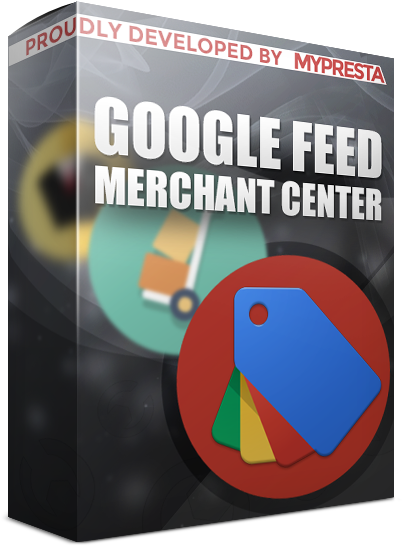
Galeria

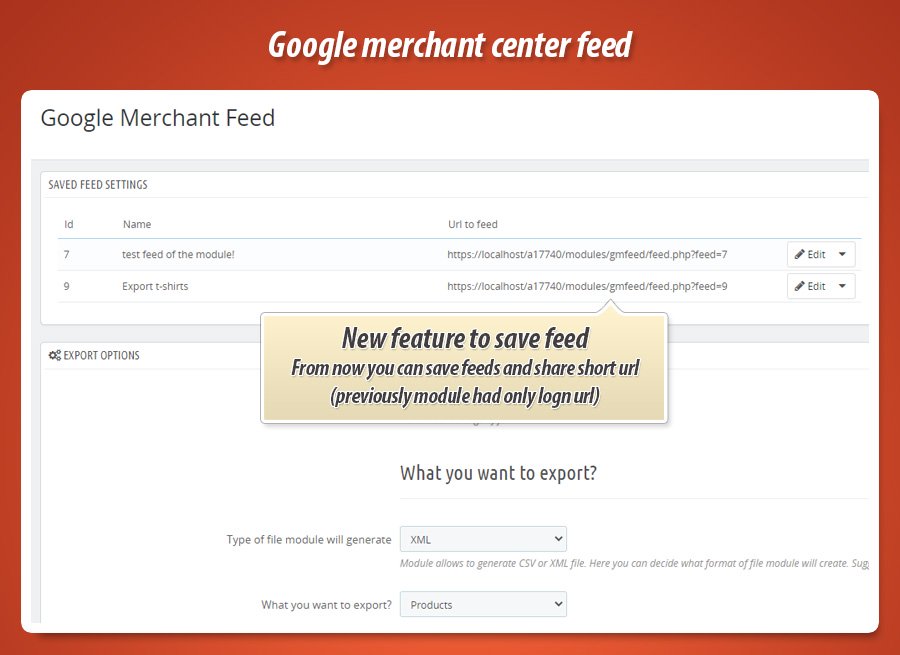
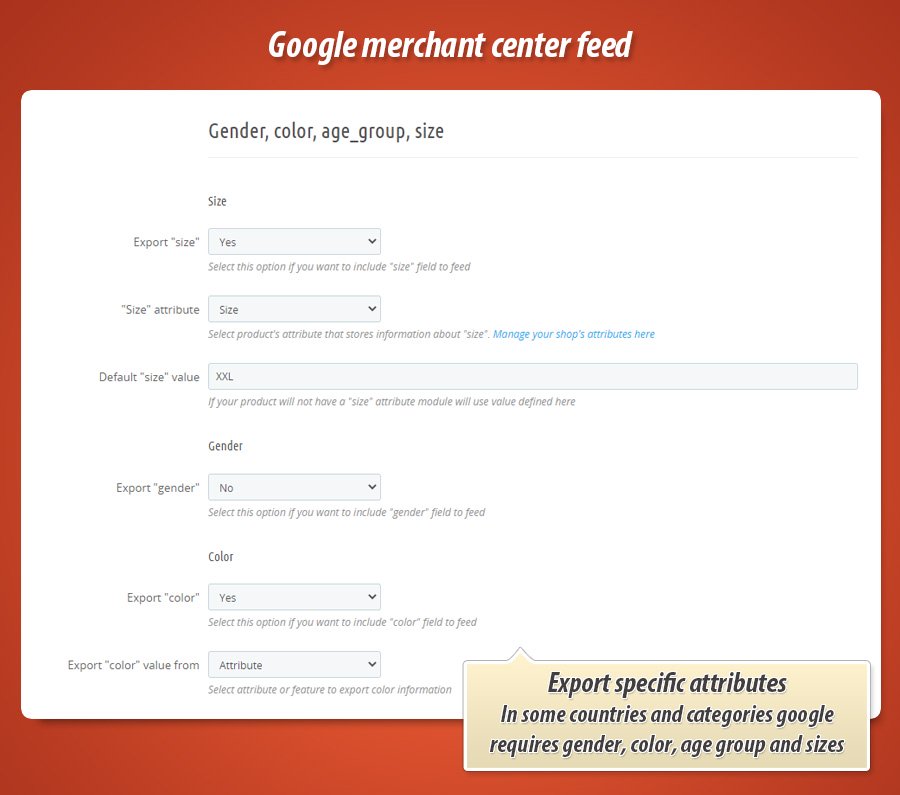
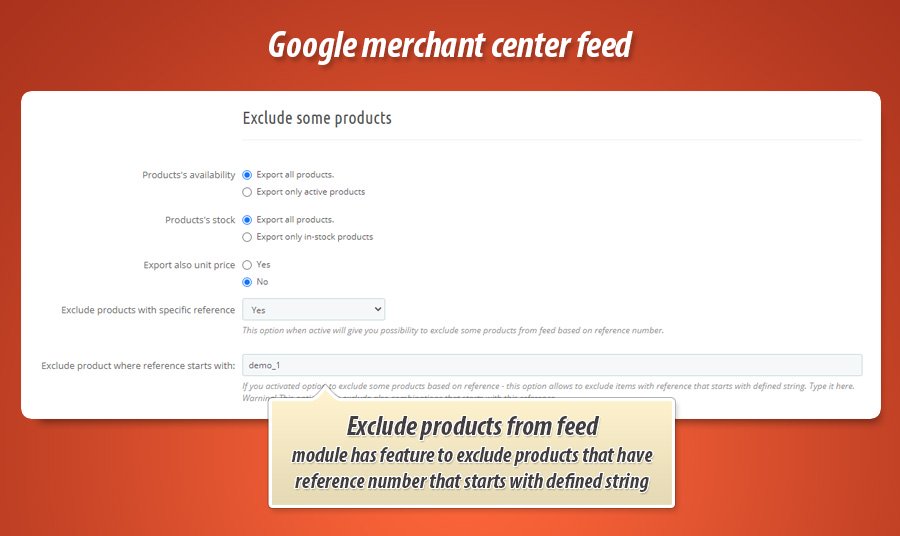
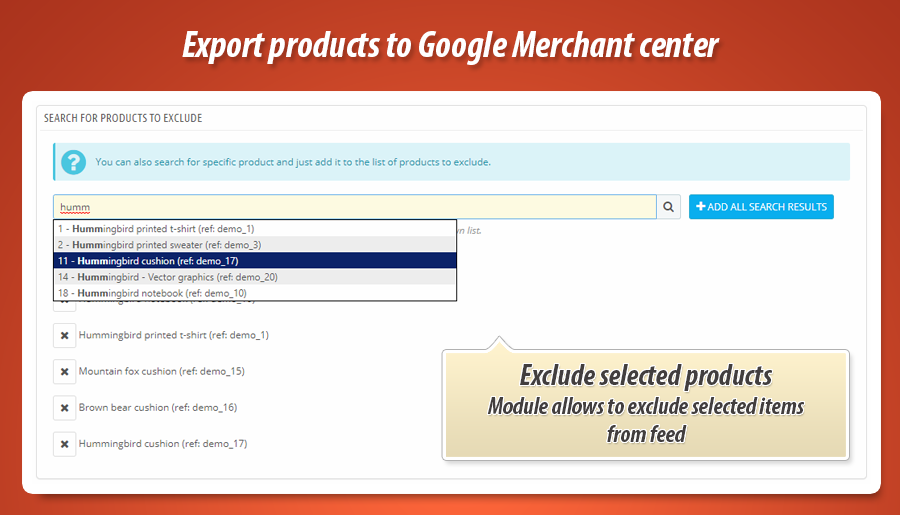
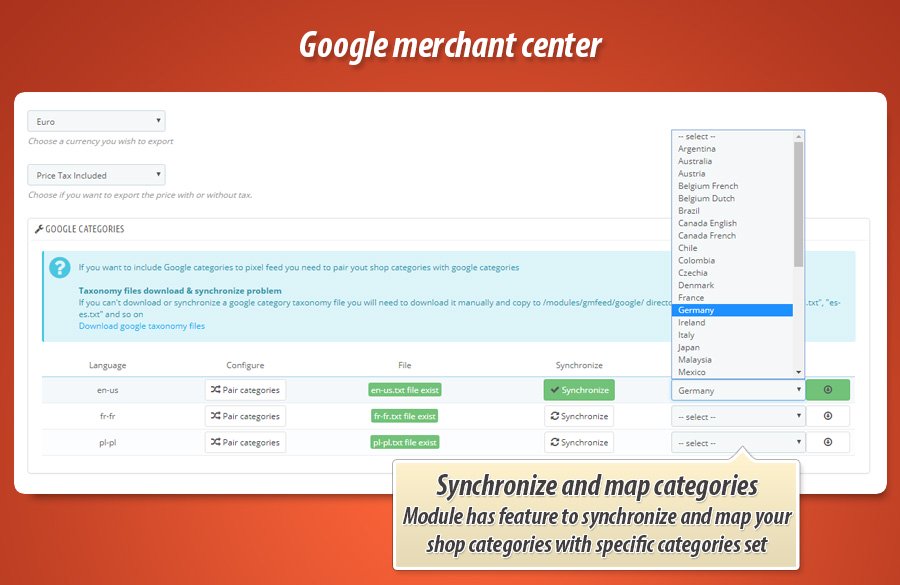
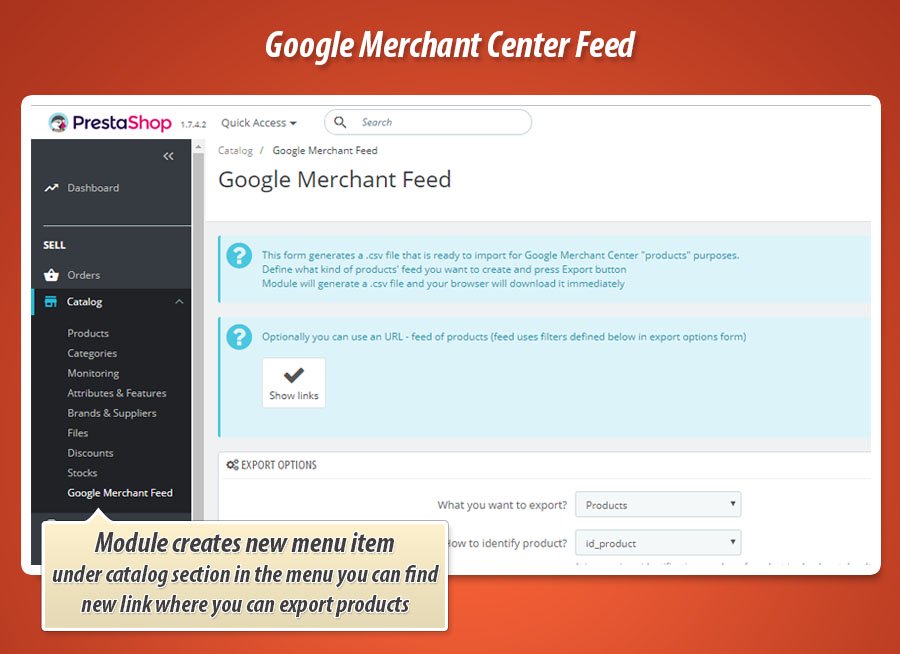
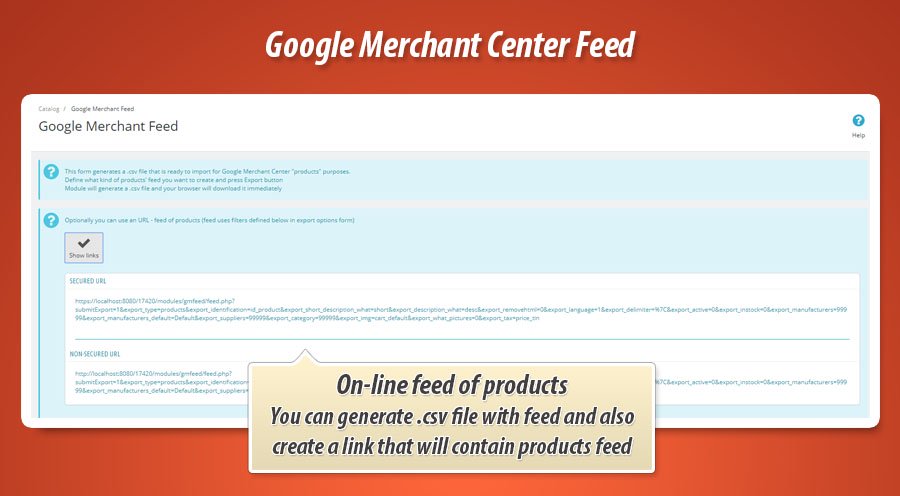
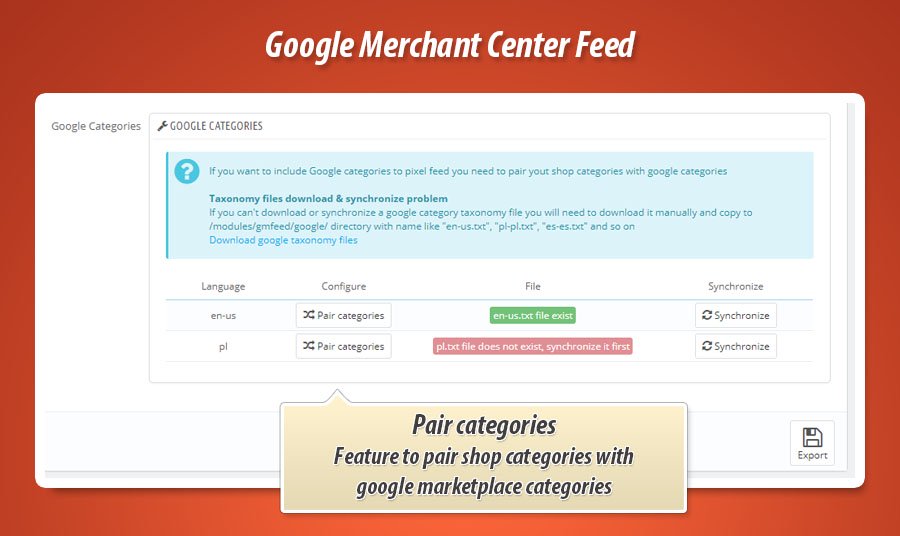
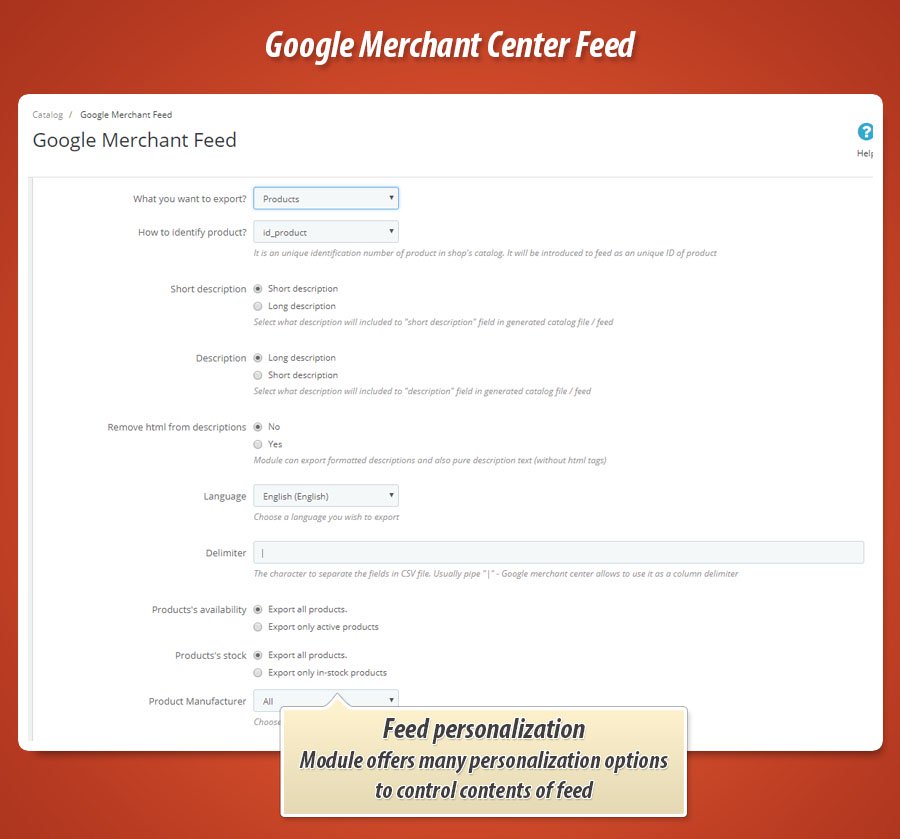
PrestaShop Google Merchant Center: Generator Feedu Produktów XML/CSV
Ten moduł PrestaShop (kompatybilny z wersjami 1.6, 1.7, 8.x) umożliwia profesjonalny eksport produktów do Google Merchant Center. Pozwala generować pliki XML lub CSV, zarówno manualnie, jak i w pełni automatycznie poprzez dedykowany URL feed. Dzięki rozbudowanym opcjom konfiguracji, możesz precyzyjnie dostosować dane produktowe, w tym identyfikatory, opisy (z usunięciem HTML), statusy dostępności, język, rozmiar zdjęć, a także ceny i walutę. Moduł wspiera specyficzne wymogi Google, takie jak GTIN, płeć, wiek, kolor i rozmiar, oraz oferuje mapowanie kategorii. Usprawnia to kampacje reklamowe i obecność produktów w Google Shopping oraz lokalnych wynikach wyszukiwania.
Jak już wiesz - jest to moduł dedykowany dla PrestaShop w wersji 8.x, 1.7 oraz 1.6 i pozwala on na eksport produktów do plików XML lub eksport produktów do plików CSV. A wszystko na potrzeby Google Merchant Center. Krótko mówiąc - dzięki modułowi dodasz swoje produkty do konta Google, zrobisz to jednorazowo i manualnie, jak również w sposób zautomatyzowany, wielokrotnie i o określonej częstotliwości.
| Dwa typy eksportu danych | |||
| Manualny - eksport do pliku | Automatyczny - dostępny online | ||
| Manualne generowanie pliku odbywa się w zapleczu sklepu, gdzie definiujesz parametry pliku z produktami. Po skonfigurowaniu formularza wystarczy go zatwierdzić, a moduł automatycznie przygotuje plik i pobierze go na Twój komputer w jeden z wybranych formatów (zobacz niżej). | Jest to automatyczny eksport, który pozwala aktualizować produkty w katalogu produktów Google Merchant Center. Moduł pozwala wygenerować unikalny adres URL, który będzie generował plik o określonych parametrach. Może być to zarówno XML, jak i CSV. | ||
| Dwa formaty pliku eksportu | |||
| Plik pobierany manualnie | Plik dostępny online | ||
| XML | CSV | XML | CSV |

Wygenerowany feed z produktami może być automatycznie pobrany (np. przy wykorzystaniu funkcji cyklicznych aktualizacji produktów w Google Merchant Center). Masz też możliwość zapisania feedu do pliku na serwerze (np. chcesz uruchomić cron job i zapisywać feed do pliku na swoim serwerze, tj. na serwerze, gdzie działa sklep).

Konfiguracja pliku z produktami
Moduł do eksportu produktów do katalogu Google Merchant Center pozwala spersonalizować plik z produktami. Cały proces personalizacji odbywa się podczas konfiguracji modułu w zapleczu sklepu. Wśród wariantów konfiguracyjnych jest wiele opcji, pozwalających zbudować listę produktów o ściśle określonych
Format pliku, który zostanie wygenerowany
Moduł pozwala na generowanie pliku CSV lub XML. Tutaj możesz zdecydować, jaki format pliku moduł utworzy. Sugerowany: lekki CSV.
Co chcesz wyeksportować?
Moduł pozwala na eksport produktów (bez kombinacji) lub wszystkich wariantów produktów (kombinacji).
Typ produktu
Moduł może wyeksportować informacje "product_type", która zawierać będzie listę kategorii, do których produkt jest przypisany.
Opcja ta może być wykorzystana jako alternatywa dla drzewa kategorii Google Shopping.
Jak identyfikować produkty w pliku?
Możesz zdecydować, jak moduł zdefiniuje ID produktu. Może to być ID produktu, ID kombinacji lub oba id_product-id_combination. Świetny sposób, aby łatwo odróżnić produkty w feedzie.
Płeć, grupa wiekowa, kolor, rozmiar
W niektórych krajach (w tym w Polsce) oraz dla niektórych kategorii produktów (np. ubrania) Google wymaga, aby w informacjach o produktach znalazły się specyficzne elementy, np. płeć, grupa wiekowa, kolor produktu czy rozmiar. Moduł umożliwia wskazanie tych wartości dynamicznie, np. na podstawie powiązania produktu z cechami (features) albo bezpośrednio z atrybutów (np. atrybut "rozmiar").

Unikalny identyfikator produktu w Google Merchant Center
Unikalne identyfikatory produktów definiują produkty, które sprzedajesz na rynku globalnym. Pozwalają rozróżnić sprzedawane przez Ciebie produkty i pomagają dopasować wyszukiwane hasła do Twoich ofert. Unikalny identyfikator produktu jest przypisywany do produktu przez producenta, dlatego ten identyfikator jest identyczny u wszystkich sprzedawców danego produktu. W Google Merchant Center jest to tzw. GTIN - global trade item number. Moduł pozwala wybrać np. numer UPC, numer EAN13, numer referencyjny.
Krótki opis
Możesz zdecydować, czy moduł powinien dołączyć krótki opis do feedu produktów.
Długi opis
Możesz zdecydować, czy moduł powinien dołączyć standardowy opis do feedu.
Usuwanie kodu HTML z opisów
Moduł pozwala na usunięcie języka HTML z opisów. Tak więc feed będzie zawierał tylko czysty tekst.
Język zastosowany w pliku
Możesz wybrać, jaki język zostanie użyty do tworzenia feedu produktów (wszystkie nazwy produktów, adresy URL do produktów itp. będą w wybranym języku).
Eksport produktów, które są na magazynie
Możesz eksportować tylko produkty, które są dostępne w magazynie, lub wszystkie.
Eksport tylko aktywnych produktów
Możesz eksportować wszystkie produkty (nawet nieaktywne) lub tylko aktywne produkty.
Informacja o dostępności (stanie magazynowym)
Możesz dołączyć rzeczywiste informacje o stanie magazynowym, wstawiając informację "w magazynie" dla wszystkich produktów, nawet jeśli niektóre z nich są niedostępne, oraz informację "niedostępne" dla wszystkich produktów, nawet jeśli niektóre z nich są dostępne.
Eksport tylko wybranej marki (producenta)
Możesz eksportować produkty tylko z wybranego producenta.
Domyślna wartość marki (producenta)
Jeśli Twoje produkty nie są przypisane do producenta (co jest wymagane dla celów feedu Google Merchant Center), możesz zdefiniować domyślną wartość pola producenta, aby umieścić tam swoją markę.
Eksport tylko wybranych dostawców
Możesz eksportować produkty tylko od wybranych dostawców.
Eksport tylko wybranej kategorii
Możesz eksportować produkty tylko z wybranej kategorii.
Rozmiar zdjęcia produktu
Możesz zdecydować, jaki format zdjęcia będzie użyty w feedzie. Tak więc możesz kontrolować jakość obrazów i ich rozmiar (szerokość i wysokość zdjęcia), aby uniknąć błędów z walidatorem feedu Google Merchant Center.
Eksport ceny
Ceny produktów w PrestaShop mogą się różnić w zależności od wielu parametrów. Np. kraju pochodzenia odwiedzającego sklep, grupy klientów, waluty czy np. specyficznych zniżek. Za pomocą tej wtyczki możesz skonkretyzować jakie ceny mają pojawić się w feedzie. Możesz wybrać grupę klientów, kraj, walutę czy aktywować opcję dołączania zniżek (specyficznych cen).
Waluta
Możesz zdecydować, jaka waluta będzie uwzględniona w feedzie produktów.
Mapowanie kategorii Google
Moduł posiada doskonałe narzędzie do mapowania kategorii Twojego sklepu z kategoriami feedu Google Merchant Center.
Funkcja do wyświetlania Twoich produktów na lokalnych powierzchniach w Google
Moduł ma opcje do dołączenia kodu sklepu do feedu. Dzięki temu będzie dostępny na niepłatnych listach produktów w różnych miejscach Google, w tym w Google Search, Google Images, Google Shopping, Google Maps i Google Lens.
Galeria Modułu










Dlaczego wybrać nasz moduł
Eksport produktów do Google Merchant Center?
Optymalizacja i Automatyzacja
Moduł eksportu produktów do Google Merchant Center optymalizuje proces dodawania produktów, oferując automatyczną generację plików XML/CSV z możliwością cyklicznej aktualizacji. Pozwala to zaoszczędzić czas i zapewnić aktualność danych w Google Shopping.
Zwiększona Sprzedaż
Moduł eksportuje produkty do Google Merchant Center, zwiększając ich widoczność i szanse na sprzedaż, dzięki precyzyjnemu dostosowaniu danych i automatycznej aktualizacji.
15 lat doświadczenia
Znamy PrestaShop od lat, moduł obsługuje wersje od 1.6 do 8.x. Umożliwia łatwy eksport produktów do Google Merchant Center w formatach XML i CSV, zarówno manualnie, jak i automatycznie.
Szeroka Personalizacja
Moduł oferuje szeroką personalizację eksportu danych do Google Merchant Center. Skonfiguruj format pliku (XML lub CSV), wybierz eksport produktów z kombinacjami lub bez, a także zdefiniuj sposób identyfikacji produktów. Dostosuj informacje o produkcie, takie jak płeć, rozmiar, kolor, marka i inne, wykorzystując cechy i atrybuty produktu.
Otwarty Kod Źródłowy
Moduł nie wspomina o otwartym kodzie źródłowym. Dostęp do kodu nie jest podkreślony, co uniemożliwia potwierdzenie otwartego dostępu i modyfikacji.
Licencja i Aktualizacje
Moduł oferuje roczne darmowe aktualizacje, zapewniające zgodność z Google Merchant Center i nowe funkcje. Po roku dostępne są duże zniżki na odnowienie. Licencja umożliwia korzystanie z modułu bezterminowo.



























